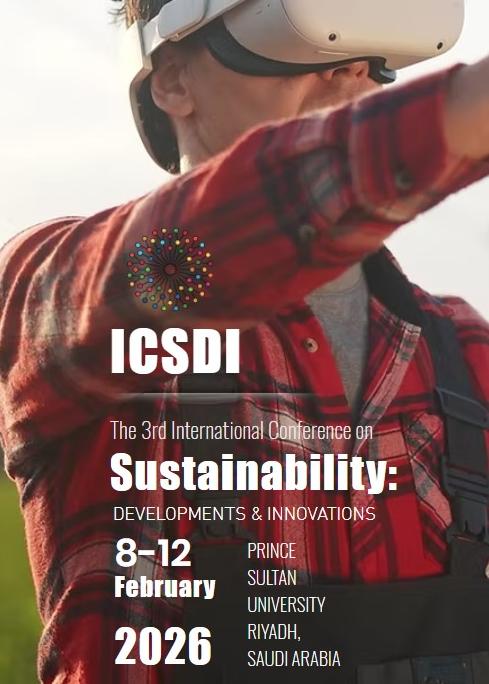47th PARIS International Conference on “Ecological Agriculture, Biodiversity and Public Health” (EABPH-25) Dec. 3-5, 2025 Paris (France)
EABPH-25
- URL: https://ffabs.org/conference/329
- Event Date: 2025-12-03 ~ 2025-12-05
- Submission Date: 2025-11-20
- Organizer: FFABS
- Location: Paris, France
Biochemistry Bioinformatics & Computational Biology Biomedical Technology Biotechnology Health & Medical Sciences (General) Molecular Biology Public Health Bioethics Biomedical Technology Ecology
Call for papers/Topics
Topics of Interest for Submission include, but are Not Limited to:
I. Foundational Concepts & Interconnections
- Defining Ecological Agriculture: Principles, practices, and philosophies (e.g., agroecology, organic farming, regenerative agriculture, permaculture).
- Biodiversity in Agricultural Systems: Agrobiodiversity (crop varieties, livestock breeds, microbial diversity, pollinators, beneficial insects), wild biodiversity in agricultural landscapes, soil biodiversity.
- The Food-Health-Environment Nexus: Understanding the complex relationships between food production, environmental health, and human well-being.
- Ecosystem Services in Agriculture: Pollination, pest control, nutrient cycling, water regulation, soil health, climate regulation.
II. Ecological Agriculture Practices & Impacts
- Sustainable Farming Methods: Crop rotation, cover cropping, reduced tillage, integrated pest management (IPM), nutrient management, water conservation.
- Organic and Biodynamic Farming: Standards, benefits, challenges, and scalability.
- Agroforestry and Polyculture: Integrating trees and multiple crops for enhanced biodiversity and productivity.
- Traditional Ecological Knowledge (TEK) in Agriculture: Indigenous practices and their relevance for sustainable food systems.
- Climate Change Mitigation and Adaptation in Agriculture: Carbon sequestration, drought resilience, climate-smart agriculture.
- Precision Agriculture and Technology: How technology can support ecological principles.
- Farm-to-Fork Strategies: Connecting sustainable production with healthy consumption.
III. Biodiversity Conservation in Agricultural Landscapes
- Measuring and Monitoring Agrobiodiversity: Indicators, tools, and data collection.
- Conservation of Genetic Resources: Seed banks, gene banks, in situ and ex situ conservation.
- Habitat Restoration and Creation: Hedgerows, buffer zones, wildlife corridors, semi-natural habitats.
- Pollinator Conservation: Strategies to protect and enhance pollinator populations.
- Soil Biodiversity and Health: Microorganisms, soil structure, and their role in ecosystem function.
- Impact of Pesticides and Fertilizers on Biodiversity: Alternatives and reduction strategies.
- Policy and Incentives for Biodiversity-Friendly Farming: Subsidies, certifications, market mechanisms.
IV. Public Health Dimensions
- Nutritional Quality of Food: How ecological agriculture impacts nutrient density, phytochemicals, and overall dietary quality.
- Food Safety and Contaminants: Reduction of pesticide residues, antibiotics, and other harmful substances in food.
- Zoonotic Diseases and One Health: The link between agricultural practices, biodiversity loss, and the emergence of infectious diseases.
- Farmer Health and Safety: Occupational hazards, mental health, and access to healthcare in rural communities.
- Dietary Patterns and Health Outcomes: Promoting healthy diets through sustainable food systems.
- Access to Healthy and Sustainable Food: Food security, food sovereignty, and equitable access.
- Antimicrobial Resistance (AMR) in Agriculture: Reducing antibiotic use in livestock and its public health implications.
- Environmental Exposure and Health: Air and water quality impacts from agricultural practices.
- Community Health and Well-being: The broader social and economic benefits of ecological agriculture.
V. Policy, Economics, and Social Aspects
- Policy Frameworks and Governance: National and international policies supporting ecological agriculture, biodiversity, and public health (e.g., CAP, Farm to Fork, CBD).
- Economic Viability of Ecological Agriculture: Market opportunities, supply chains, value addition, farmer livelihoods.
- Consumer Awareness and Education: Promoting sustainable consumption and dietary choices.
- Participatory Approaches and Stakeholder Engagement: Collaboration among farmers, scientists, policymakers, and consumers.
- Social Equity and Justice in Food Systems: Addressing disparities and ensuring fair transitions.
- Research, Innovation, and Knowledge Transfer: Bridging the gap between science and practice.
- Investment and Funding for Sustainable Food Systems: Public and private funding mechanisms.














